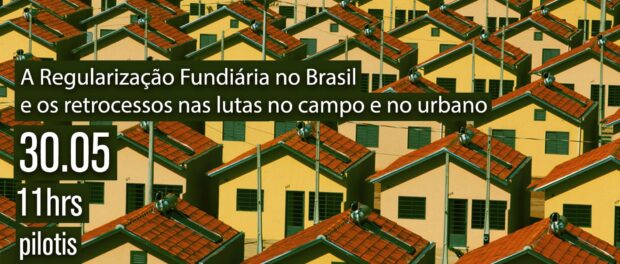
On December 22, 2016, President Michel Temer revised a law that specifically regularizes urban and rural land owned by the federal government, notably eliminating requirements for upgrading infrastructure on those lands. The revision was passed by the Senate on May 24 without consulting affected groups, experts, or representative bodies of land regularization. On May 30, the student council at Rio de Janeiro’s Pontifical Catholic University (PUC-Rio) hosted the debate “Land Regularization in Brazil: Setbacks in the Struggle for the Country and the City” to discuss and raise awareness of the change.
The legal alteration, known as Interim Measure (MP by the Portuguese acronym) 759/16, has caused major concern for housing activist, environmental and human rights groups across Brazil. By removing barriers to foreign and domestic companies to privatize and exploit public land, the law will directly impact the biodiversity and environmental protection of large areas, particularly the Amazon.
Meanwhile, in the urban context, the new law severely undermines the land rights of favela residents by giving equal priority to private interests and creating the conditions for commercial exploitation of urban areas occupied by low-income communities.
On the panel at the PUC event was: Maria Lúcia de Pontes, Public Defender with the Rio de Janeiro Land and Housing Nucleus (NUTH); Fernanda Vieira, professor and lawyer from the Mariana Criola Popular Advisory Centre; Alexandre Nascimento, PUC-Rio Social Science undergraduate and Brazilian Institute for the United National Environmental Programme (Instituto Brasil PNUMA) graduate in Environmental Management (UFRJ); and Pedro Paulo Cruz, social scientist and former director of Housing Regularization at ITERJ (Institute of State Lands of Rio de Janeiro) from 2000-2010.
Pedro Paulo Cruz started the discussion by contextualizing the new measure within historical legal frameworks around land rights in Brazil. Section 5 of Brazil’s Constitution declares that public land must serve a social function for the population. For Rio de Janeiro specifically, these requirements are also mentioned in the state’s constitution. However, Temer’s revision is a clear departure from the values and protections set out in the constitution, denying the rights of many agrarian and low-income families–whose need to dependably live on and off the land is greater than their need for the right to sell it–by enabling the easy privatization of public land.
Cruz argued that the ongoing legacy of slavery is a historical factor which allows Brazil’s politicians to neglect the needs of citizens. “Many residents keep being distanced further and further from the city center where they work and earn their living,” Cruz said. Over 77,000 people were evicted from communities all over Rio de Janeiro during the period leading up to the 2014 World Cup and the 2016 Olympics, while market forces also displaced many through real estate speculation and urban renewal in this period.
Fernanda Vieira followed Cruz’s critique. In Brazil, there has been a surging war on land rights activists and she explained that the new MP will heighten the militaristic means with which the government quiets opposition.
Like Cruz, she noted that the economic practices that have shaped the world’s largest economies have resulted in and continued to advance unconstitutional policies that are against traditional workers’ rights. “We are further away from a city that is inclusive and democratic. That is why conversations like this are so crucial,” Vieira explained.
In the case of favelas, the new MP incentivizes the government to sell plots to beneficiaries instead of improving conditions of these informal residential communities that have long been abandoned by the government. “It is a perverse logic within a larger neoliberal framework that does not guarantee any right or access to decent citizenship with dignity for the majority of the population, meaning that families are going to suffer brutal pressure from capital in order to possibly maintain their land.”
Alex Nascimento focused on the social impacts of the new legislation. Although land disputes have been common since Brazil’s colonial founding, he declared the debate concerning land will become an overwhelming factor in the ability for indigenous and quilombo communities to survive and thrive. Following the philosophy of sovereignty, Nascimento highlighted that land is a key element within the right to not only protect oneself from outside forces but to sustain one’s livelihood. The conflict that is currently surging in Brazil is not new and it deals with land, the key for people to claim sovereignty and to sustain themselves and survive. “We need to realize that we are not only losing land, we are losing culture too, and we are losing our biodiversity,” he said.
The last speaker on the panel, Maria Lúcia de Pontes, emphasized how vulnerable Brazil could become to foreign interests in the coming years. Like the Dilma and Lula administrations that had been criticized for collaborating heavily with international companies, the new MP will allow foreign entities to buy publicly owned land despite the social rights of Brazilians. This move was seen by panelists as clearly demonstrating the current administration’s disinterest in improving the lives of favela residents. “These are people who do not dream about a new year model car, they dream of having proper security over their land and that dream is being threatened,” Pontes insisted.
Each of the speakers criticized recent trends decreasing Brazil’s lowest income groups’ access to land and housing and called on audience members to remain vigilant and active in response to current trends and policies.

